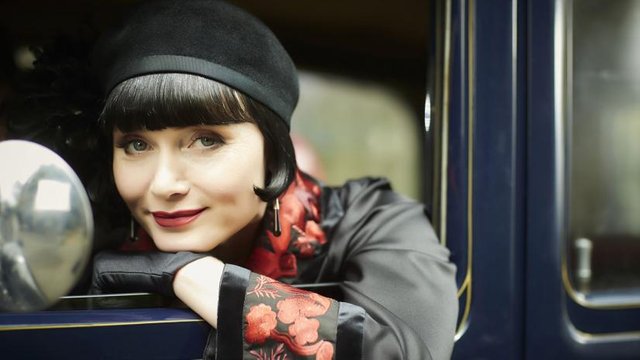A bit of Mary Sue every day about praise of not suffering.
Recently, I started watching wholesale episodes of Miss Fisher’s Murder Mysteries and of course, which is probably the most natural thing in the world I fell in love with the series and the heroine. When I shared my feelings with a friend, she said that the heroine did not arouse her sympathy because she suits too much Mary Sue's scheme. It made me wonder - how to distinguish Mary Sue's annoying pattern from a typical character who is confident, competent and thus successful.
Let me start with the fact that lately I have the impression that there is an increasingly widespread belief that an interesting hero must have flaws, problems and ills. To some extent this is true - but not always. Well, we all from time to time get a lot of joy from watching the heroes who have some ills but otherwise they usually succeed, succeed and win over evil. Especially when the place of existential dilemmas can easily be replaced by i.e. heartbeats. If we look at the heroes of entertainment cinema, or just such popular TV detectives - from Sherlock to Miss Fisher we can see that even if there is an element of some problems and struggles with them, they always end up victorious - because that's the nature of this type of story. In procedural series, the heroes are more or less victorious over evil every week, as are the super heroes who ultimately must win. And if they haven't won, it's probably only half the story. This does not mean that we are dealing with characters written at the highest degree of psychological credibility, but we do not always expect it. Ultimately, as viewers, we have the power to distinguish realistic characters from those slightly tuned up, whose observation gives us satisfaction precisely because their effectiveness and abilities, as well as competences allow us to de-stress and admire their effectiveness.
Mary Sue is a concept that has a lot of definitions (since it appeared in the ’70s) but generally means a female figure who is written with only advantages, without major disadvantages, which all goes on the first try, is beautiful, talented, and above all, selected. At the same time, the concept itself has undergone an interesting evolution - from being a critique of writing uninterestingly ideal female characters (rather from the lack of the ability to write a good and in-depth character of a woman in a non-supporting role) to the term that is often used to criticize feminist heroines, or in general leading characters women who are credited with being Mary Sue when they demonstrate any skills or competences. The concept of Mary Sue has become widespread in recent years but has also incredibly expanded its boundaries, taking all heroes and heroines on their way who are not defeated or who are inherently better than worse. Almost all heroes of collective imagination fell into this category, from Harry Potter, through Luke Skywalker, Batman, to Captain Marvel, and Rey from the new Star Wars. Ultimately, the concept spread so much that you can add to it almost any classically constructed hero character, especially the heroine. No wonder that it is increasingly difficult to distinguish simply the classic foreground character which for some reason (skills, competences, unusualness) was in the foreground, from Mary Sue hated by viewers and readers.
So where do you look for features? Personally, I would say that it depends a bit on our own perception, because in culture some things are not necessarily hard. But first of all - I always ask myself whether if the same hero had the same characteristics would immediately reach for this term. For example, Miss Fisher is capable of incredibly and very confident, like almost every private male detective on television and literature with a slight exclusion of some sad Swedes. Similarly with super heroines - they are usually accused of being Mary Sue when they are like their male counterparts - that is, they possess extraordinary power that allows them to get out of trouble from any threat. I have a feeling that in general the character of a super heroine cannot be Mary Sue, because as if in the very heroism it is emphasized that we are dealing with a "hero" who will be more competent and effective than anyone else. It is a certain agreement between the recipients and creators that the super hero (in the cinema edition more than the comic one) that the super hero will succeed more than the average Smith. Frequent criticism of too many competences of female characters leads, moreover, to this paradox in which the authors of the heroines should simultaneously put them in the foreground, keep them aloof, give them unique features, but not too much and let them show off their competences but only in a very limited way. Ultimately, the female figure can be but not too much, because then she falls into the category of "Mary Sue".
The second issue is the matter of the stigma of the chosen one. In general, stories are full of the chosen ones. As you know, Mary Sue also usually belongs to this category. I feel Mary Sue will decide whether a given "chosen" character or not just how the author justifies this "choice". If the justification is reasonable, for example, I think that Potter has it - showing that this choice is a consequence of certain events and not by accident, I am able to let go. If the character is chosen "because it is" then the red lamp lights up. But again - literature, especially fantastic is full of the chosen ones, because the chosen one has been part of the topos for a very long time. Another issue is beauty. I have no problem that heroes and heroines are cute. Especially in the world of film, overrepresentation of beautiful people is everywhere. For me, Mary Sue is not about beauty, even unusual or exaggerated, only her depreciation by the heroine or hero. Bruce Wayne does not sit in front of the mirror noting the unevenness of his divine cheekbones. However, when the heroine or hero declares that they are ugly and unattractive and then comes a vampire and tells them that they are the most beautiful in the world just do not see it - well, then there is a problem.
One of the elements that is often presented as an example of Mary Sue's typical behavior is the approach to some difficult activity that goes on the first try. Again - this is an understandable objection, but at the same time - in films I am able to understand when creators skip unsuccessful attempts or training (recently I was deeply hated for training montages, because they are all exactly the same) in order to keep the pace of the action. Ultimately, my interest in Star Wars did not fall from the fact that Rey turned out to be quite good at waving a lightsaber, because the emotional burden of history lay somewhere else. Plus the whole story, which goes back to the very heart of the myths and topos of the hero's journey from the beginning assumed that we would take the appearance of certain clues for a good coin. The novel is a bit different because the pace of the narrative allows a lot more space to enter time for study or training. However, again - most of the heroes of adventure stories are unlikely to suffer a spectacular failure after learning, which is not in line with the truth of life. Not everyone who learns to drive a car will get a driving license.
However, the most important element to distinguish potentially Mary Sue from a character who is simply competent would be the so-called self insert, i.e. entering an improved, nicer, smarter version of the author into a novel. In this aspect, it is easiest to identify in fan fiction, because there the distance between the text and the authors is the smallest. In cinema or literature we are able to catch it less often (we need to know more about the author), although in total it does not happen so rarely, I could bet that the authors put improved versions of themselves even in very good novels. Ultimately, that's what we have imagination to even be able to reinvent ourselves. I honestly admit that this element does not seem to me, especially in fan fiction, such a big problem - of course if the author wants to write mainly for his own pleasure. It will not necessarily be outstanding literature but I understand the satisfaction of improving myself on paper. Although of course it depends on the personal approach to fan fiction - whether we see them as something that is to be a writer's skill or to serve mainly the pleasure of the author. Personally, I am more in favor of option number two.
My reflection boils down to the fact that characters who meet Mary Sue's assumptions do not necessarily have to upset us. I must admit that in the case of stories that are supposed to provide me with entertainment or escapism, I admit such heroes much more. I do not necessarily feel like always watching the characters suffer or struggle with their fate. Contemplative existential sadness Batman always seemed to me much more annoying in movies than Superman, who had little concern at all. Doctor House suffered a lot but hardly anyone had ever died (probably during the first two seasons he was diagnosed too late once). Returning to Miss Fisher and her abilities - deciding on such a convention, both the creators and the viewers a little know what they are writing. Of course, you can give up the joyful ’20s and watch Wallander struggle with diabetes and depression, but sometimes we need someone to tell us who killed us with a smile (it sounded just a little disturbing). Ultimately, since we have already decided that literature and film have the right to offer us escapism, a part of escaping from reality will be meeting with unbelievably competent people. I am ready to agree to this as long as - and it is probably crucial, I realize that both I and the creators understand this convention. Perhaps this understanding of the creator - who they write - would be this key element here. Ultimately, however, after a whole day of being a human who has to struggle with the fact that she is not the prettiest in the world, she does not manage everything the first time and definitely is not the chosen one of the Gods, sometimes it's nice to look at those who are like that. The key is not to watch too much, because pure escapism will not help anything, nor will it always entertain.




Congratulations @anaerwu! You have completed the following achievement on the Steem blockchain and have been rewarded with new badge(s) :
You can view your badges on your Steem Board and compare to others on the Steem Ranking
If you no longer want to receive notifications, reply to this comment with the word
STOP